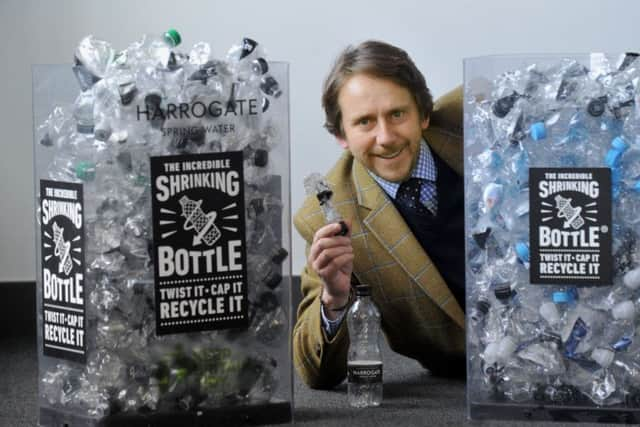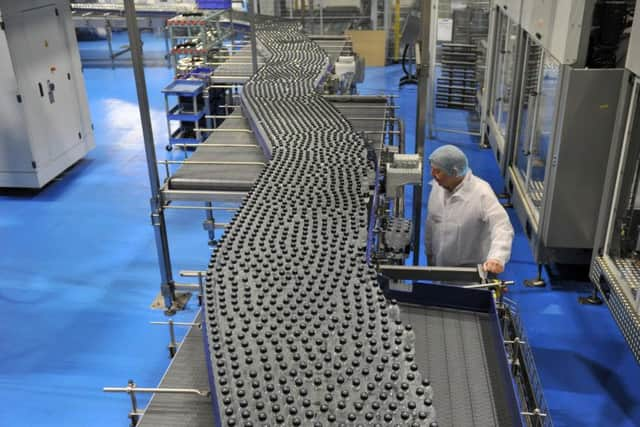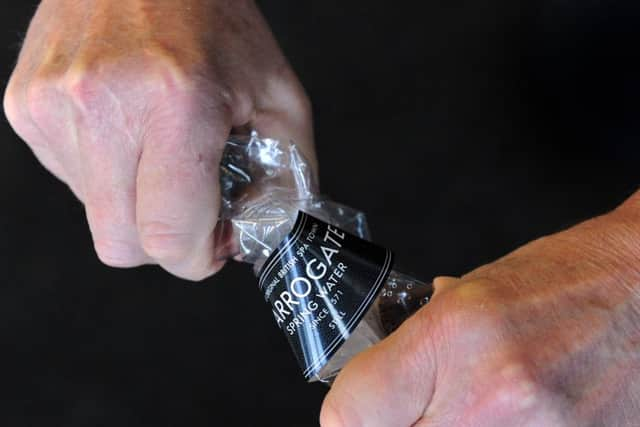'˜Don't demonise bottled water.' says Harrogate Water boss
and live on Freeview channel 276
Few people could fail to be shocked by the recent images of our oceans clogged with plastic bottles. Probably none more so than James Cain, the managing director of Harrogate Water, a company which produces half a million plastic bottles of water a day.
“Photographs of rivers and ocean clogged with plastic bottles is shocking and embarrassing to all of us,” he says. “We have become a throwaway society.”
Advertisement
Hide AdAdvertisement
Hide AdWith the latest report published this week claiming whales and sharks could be swallowing hundreds of tiny bits of plastic a day, the war on pollution has recently stepped up a notch. Cain too acknowledges the part industry has to play in tackling the problem, but feels that bottled water has unfairly taken the brunt of the backlash, with some even calling for it to be banned in favour of more public water fountains.


“The fact the words ‘single-use’ are associated with bottled water is just not accurate,” he says. “The majority of plastic water bottles are made from PET – polyethylene terephthalate – which is 100 per cent recyclable and can be recycled an infinite number of times.”
Cain insist that everything, including the caps, labels and packaging, is recyclable, a fact many people don’t seem to realise. It is clear he feels passionate about the environment and very frustrated by the demonising of his natural product – the oldest water brand in Britain.
Of course, he has a vested interest in us continuing to drink bottled water. He has invested millions in Harrogate Water, which employs 100 people, and the business is undergoing further expansion. But it seems more than that, and the company’s longstanding relationship with environmental charity Keep Britain Tidy is testimony to this.
Advertisement
Hide AdAdvertisement
Hide Ad“We are very careful who we partner with,” says Richard McIlwain, Keep Britain Tidy’s deputy chief executive. “Harrogate Spring Water works very closely with us. It is a responsible brand.”


Between 1995 and 2016, the UK bottled water market (including water coolers), has grown from just 800m litres to almost 3.2bn litres and the industry is now worth more than £2.4bn.
“We are capturing something nature has given us and therefore protecting the environment is in our DNA,” emphasises Cain. “Every aspect of what we do here is environmentally led, we recycle everything – nothing is taken to landfill. We are not telling people not to drink tap water and we never have. We are giving them a choice. If they want to drink a natural product that has been there for thousands of years and has nothing added to it then they should be allowed to and we are giving them a way of doing that. Tap water has had chemicals added and not everyone wants to drink it.
“Yes, sales of bottled water have gone up, but there has been a reduction in the amount of sugary drinks people consume and that can only be good for the NHS and everyone. I am worried that people will just return to drinking sugary drinks if there is a restriction on bottled water.”
Cain says what is needed is a change in our behaviour.


Advertisement
Hide AdAdvertisement
Hide Ad“We don’t want to preach to people, we want to educate them. When PET is disposed of properly it represents the greenest option available,” he says. “What we need to do is to get people to recycle their plastic bottles. I spoke to a colleague in Japan recently and they just do not understand why we are even talking about this, they just do not have a problem with litter.”
Last year, Harrogate Water teamed up with Keep Britain Tidy to launch what was dubbed the ‘incredible shrinking bottle’ in a bid to combat the number of plastic bottles put in street bins which then go to landfill. Research carried out by Keep Britain Tidy revealed that, while 95 per cent of consumers are likely to recycle at home, this falls by more than half when they are out.
“Our bottles are right-weighted which means we use the minimum amount of plastic while maintaining the bottle’s structure,” explains Harrogate Water’s marketing director Nicky Cain. “They also have an innovative lattice design which means once emptied they can be twisted and crushed to a very small size to encourage people on the go to take them home and put them in their recycling bin.”
At the time of the launch, Keep Britain Tidy chief executive Allison Ogden-Newton said: “A PET plastic water bottle is one of the best examples of easily-recyclable packaging, with every part of the product 100 per cent recyclable and all can be disposed of together.”


Advertisement
Hide AdAdvertisement
Hide AdWhile supporting this stance, Keep Britain Tidy also believes another solution to the waste problem is introducing a deposit return scheme (DRS), something not all manufacturers are keen on due to the cost.
“We have to change people’s behaviour, but we have to make it easier for them to change that behaviour or it just won’t happen,” says McIlwain. “We are not here to call for bans on a particular product, but I don’t think the manufacturers who are putting their products onto the market, be it plastic bottles, aluminium cans or cartons, can’t then say they have nothing to do with what happens to that packaging.”
McIlwain is a big supporter of DRS in dealing with the problem of people dumping their plastic bottles and cans ‘on the go’.
“There are a lot of countries where DRS has a huge impact on recycling rates, some up to 95 per cent, and we would support a well-designed scheme in this country. Industry would have to get involved with bearing the brunt of some of the cost, but it would be minimal.”
Advertisement
Hide AdAdvertisement
Hide AdIncreasing on street recycling bins wouldn’t work, McIlwain added, due to high levels of contamination from things such as fast food cartons which means the bottles can no longer be recycled. He said the charity also supported the expansion of free tap water refills.
According to industry body, Water UK, shops, cafes and businesses will offer free water refill points in every major city and town in England by 2021. Whitbread, which owns Costa Coffee and Premier Inn, is the first to sign up to the initiative and will provide water in all of its branches from next month. There are also calls for more public water fountains.


In the US, where fountains are widespread, bottled water consumption has increased. McIlwain says that it is a combination of factors that will tackle the UK’s litter problem, including more responsible manufacturers. This is something echoed by James Cain. “We need some joined-up thinking,” he says. “It is about getting the infrastructure right in this country as well as raising consumer understanding about recycling and litter.”
90 per cent of bottled water consumers want to recycle more and say green issues are important to them.
Advertisement
Hide AdAdvertisement
Hide Ad78 per cent always recycle at home and 95 per cent are likely to recycle at home but only 41 per cent are likely to recycle when out and about.
61 per cent are more likely to take rubbish home if it can be easily compacted.
98 per cent of litter in our oceans originates from countries outside of Europe and USA.
In the UK beverage containers account for a small percentage of litter (2.1 per cent PET plastic bottles and 3.5 per cent cans).
99 per cent of local authorities are able to collect and recycle PET bottles.
www.keepbritaintidy.org